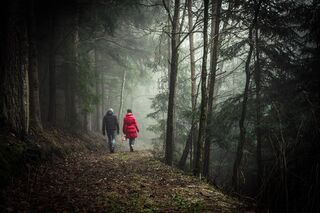Memory
Why the Pandemic Is Swallowing Up Our Memories
The antidote: Keep pushing the refresh button on “place”
Posted August 27, 2020 Reviewed by Lybi Ma

The psychologist Tim Harford recently made a startling claim:
“We won’t remember much of what we did during the pandemic.”
Wait, can that possibly be right? Isn’t it true that we remember things best when strong emotions are attached to the experience? And haven’t strong emotions been coming fast and furious these past six months? Yes and Yes. And isn’t novelty also a component of memory-making? When we encounter new things, we notice more, we feel more and we take more detailed mental notes? True again. The pandemic has been dousing our brains in novelty; none of us, after all, has been through anything quite like this.
But here’s the thing: One type of novelty seems to matter most in memory-making: the novelty of place.
Memory is profoundly linked to our surroundings. When a new experience is encoded, the brain “pins it” to the physical location where it happened. Even if the new thing is just an abstract little aha moment. (For example, Harford says he can remember exactly where he was when he first grasped Arrow’s Impossibility Theorem. You may remember where you were when you learned you've been saying Newfoundland wrong.)
When we find ourselves in a new landscape, our brains appear to start recording in high-def. It’s how they developed. Nature built our wetware to help us find our way back to the cave and to recall threats and opportunities encountered along the way. The great Stanford cognitive scientist Barbara Tversky makes strong claims that physical movement is the basis of thought itself. What snags our attention most vividly, as we explore, gets filed in the vaults of the hippocampus. To move is to remember.
All this to say that while the last six months have presented tons of situational novelty, there’s been very little novelty in our surroundings. When we look back and ask questions about 2020—“Where were you when ...”—the boring answer for most of us will probably be: at home. Our neural note-taking mechanisms were suppressed because our environment didn’t change.
I shouldn’t use the royal “we.” Because not everyone has been hunkered down in their cave. One couple I know bucked the trend in a way that now looks downright inspired.
Drew and Daphne's international holiday plans – like everyone else’s – collapsed when the pandemic hit. But domestic travel was still allowed. So they flew to Calgary and bicycled back to Vancouver, following The Great Trail, the longest recreational path on the planet.
Over 35 days they meandered their socially distanced way homeward. Every evening Drew posted a summary of the day on Facebook, featuring some juicy, indelible moment: an encounter with a bear or a spooky passage through a tunnel or an exhilarating view from a summit. On some future Saturday night, as the pair reflect on it, the trip will likely seem much longer than it was because of all these “episodes” they recorded and encoded. Their “August 2020” is simply more richly archived in their memory banks than the August 2020 of the rest of us. (The British psychologist Claudia Hammond coined a term to capture the weirdness of this phenomenon – that your holiday seems to rip by, but then feel long when you look back on it. She called it “the vacation paradox.”)
Drew and Daphne had a few other things going for them, temporally. They were grinding up mountain passes in scorching summer heat. Both endurance exercise and elevated core temperature have been shown to “slow" time, thereby extending the experience when we recall it later. And while their getaway wasn’t a super-high-adrenaline adventure, there were more stomach-in-the-throat moments (the bears, the tunnels) than at your typical, slumbery holiday at an all-inclusive. Those moments may have stretched time further. In lab experiments, arachnophobia sufferers have reported that the clock moved awfully slowly when they were looking at spiders. Fear is molasses in the gears of life.
By luck or design or both, Drew and Daphne may have cracked the nut on how to get more vacation time than you actually get: Keep moving across new ground.
Here’s the takeaway: Unless you’re physically quarantined inside your home, get thee out into nature and … go somewhere. Vary your routes, serving your brain the geographic special-of-the-day. Keep pushing the refresh button on “place.”
And write in a journal about what this time in your life feels like.
Because you’re otherwise very likely to forget.


